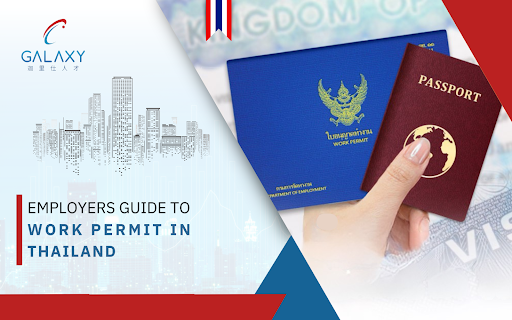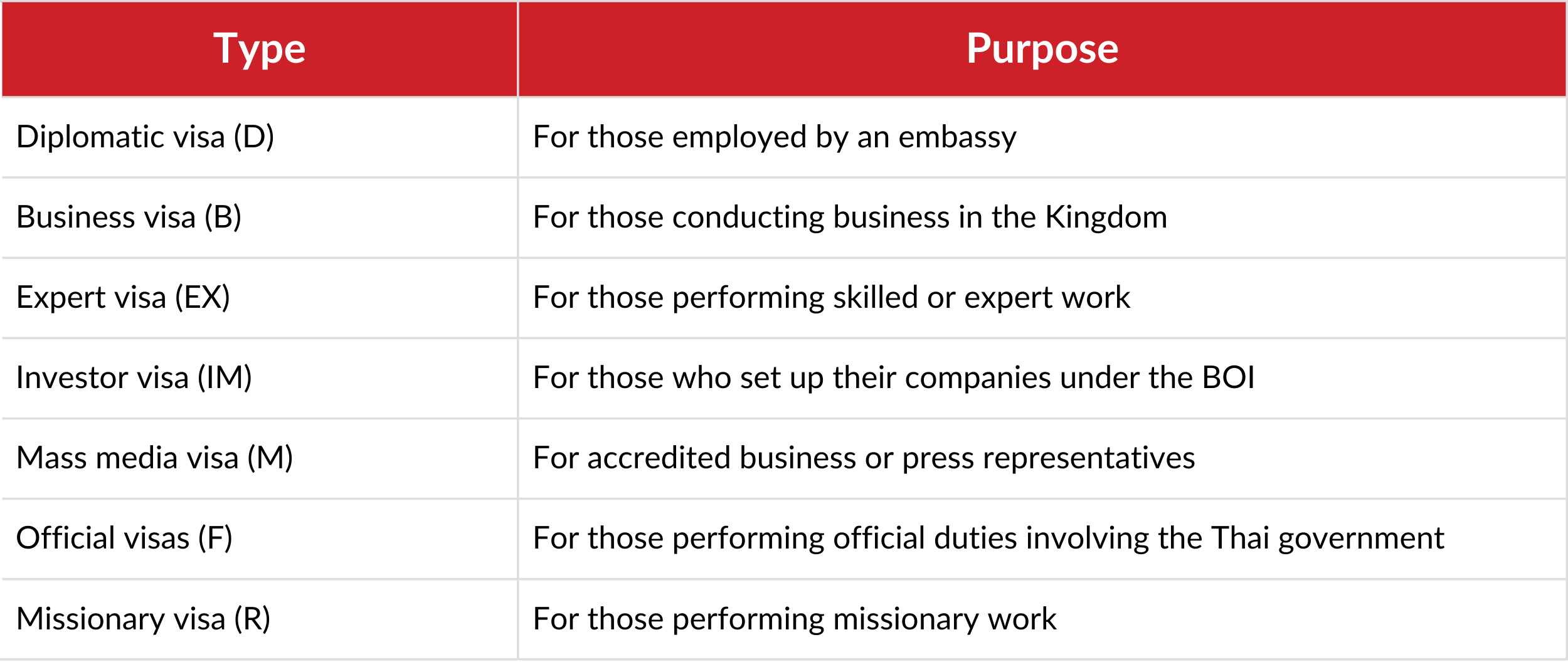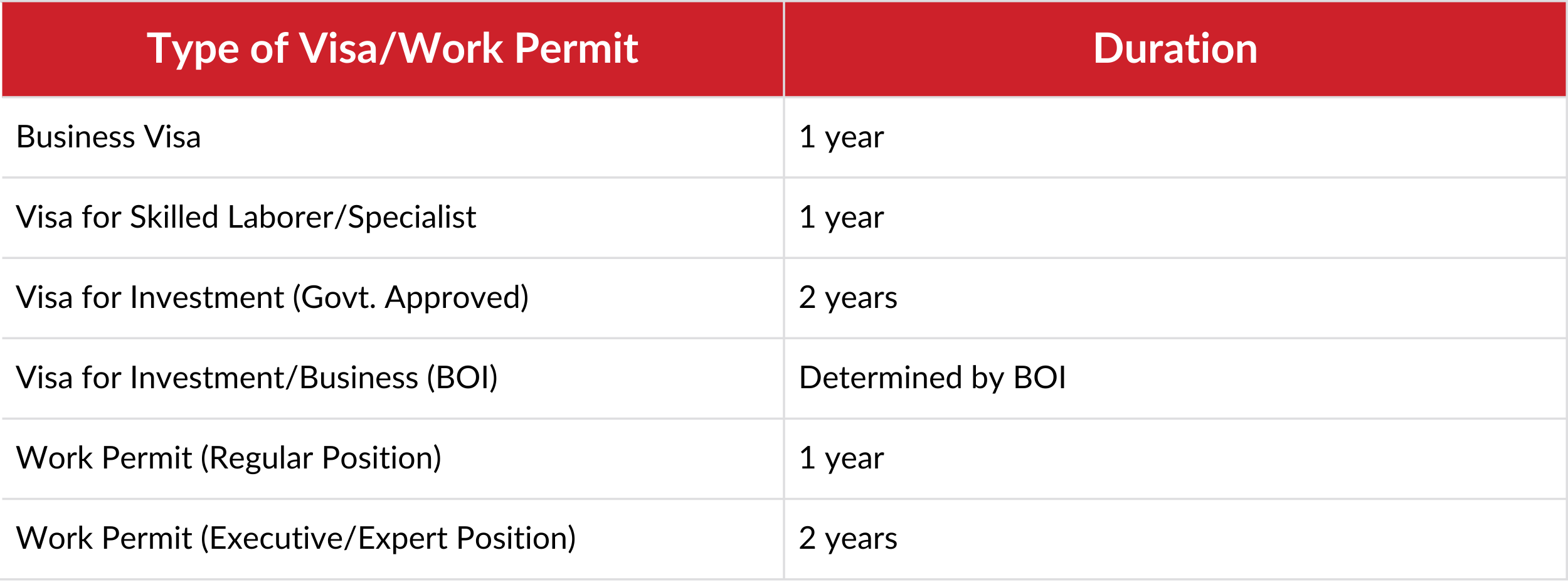Work Permits in Thailand : What Employers Should Know?

Thailand is a gateway to the ASEAN Economic Community, offering access to a market of 676.6 million consumers and robust trade connections with neighbouring economies such as China and India. To achieve high-income status by 2036, the Royal Thai Government has outlined a 20-year Strategy that drives economic transformation through Thailand 4.0. This initiative fosters innovation across key sectors like automation, aviation, biofuels, and digital industries, while the Eastern Economic Corridor (EEC) plays a pivotal role in accelerating industrial growth.
To further strengthen its position as an economic hub, Thailand offers various visa programs designed to attract skilled professionals and investors. The SMART Visa targets individuals in 13 key S-Curve industries, while the Long-Term Resident (LTR) Visa offers tax incentives for high-potential individuals. The Thailand Elite Visa also permits long-term stays ranging from 5 to 20 years, providing exclusive privileges such as settlement assistance and VIP services. These visa programs and BOI incentives help create a favourable environment for expatriates to contribute to Thailand’s thriving economy.
This guide provides employers with a detailed overview of work permit in Thailand and work visa regulations, empowering them to navigate the application process and ensure compliance with Thai labour laws.
Table Of Content
- Regulation of Foreign Employment In Thailand
- Who Needs A Work Permit In Thailand
- Exemption From A Work Permit
- Entry for Work Without A Work Permit In Special Cases
- How To Get A Work Permit In Thailand?
- Visas And Immigration Law
- Duration of A Visa And Work Permit
- Renewal Conditions
- Work Permit And Visas for BOI Promoted Companies
- Smart Visa
- Single Window For Visa And Work Permit System
- Duties Of Employer
- Fines And Penalties
- Conclusion
Regulation of Foreign Employment in Thailand
The Alien Working Act B.E. 2551 (2008) primarily regulates foreign employment in Thailand, requiring all foreigners to secure a work permit before employment in Thailand alongside strict compliance with immigration laws.
However, certain occupations – such as labour, agriculture, accounting (excluding internal audits on occasions), civil engineering, clerical roles, legal services, and more – are strictly prohibited for foreigners. Only Myanmar, Laos, and Cambodian nationals can work in the labour and domestic sectors.
Therefore, one must refer to the list of restricted occupations before planning a career move in Thailand.
Who needs a Work Permit in Thailand?
All foreign nationals who wish to work legally in Thailand must obtain a work permit, except those exempted under the laws governing work permit requirements in the Kingdom. Specifically, a work permit is required for:
- Foreign nationals employed by a Thai company or a foreign entity operating in Thailand.
- Entrepreneurs wishing to establish and run a business in Thailand.
- Freelancers or self-employed individuals providing services in Thailand (even if not employed by a company).
In summary, if you work in Thailand, you must obtain a work permit before commencing any work unless you fall under specific exemptions.
Exemption from a Work Permit
Under Thai law, certain activities are not classified as ‘work’ and do not require a work permit. These exemptions include:
- Attending meetings, seminars, exhibitions, or trade fairs.
- Attending technical training or seminar.
- Purchase of goods at a trade fair.
- Participating in business visits, academic lectures, or board meetings of one’s company.
Exemptions also apply to:
- Diplomats or Consulars entering Thailand for official duties.
- UN officials and representatives of member countries.
- Personal Servants of above officials.
- Individuals on missions under Government agreements or to benefit education, culture, arts or sports.
- Individuals with Government’ special permission.
Entry for Work Without a Work Permit in Special Cases
At its discretion, the Government can conditionally allow foreigners to enter the kingdom without a work permit in exceptional cases to fulfill ‘urgent and essential work’ for a period not exceeding 15 days, provided that they submit a written notification (form WP-10) along with other required documents.
In such cases, foreigners can enter Thailand with any visa, including a transit visa.
How do you get a Work Permit in Thailand?
While employers can submit applications on employees’ behalf, the permit is only issued after the employee legally enters Thailand.
- Before applying, those entering on a tourist or transit visa must convert their status to a Non-Immigrant B Visa.
- Required documents include a passport with a valid Non-Immigrant B visa, educational qualifications, work references, a medical certificate, three recent photographs (5×6 cm), and, if applicable, additional documents for licensed professions or marriage to a Thai national.
- Applications must be submitted to the Department of Employment in Bangkok or provincial employment offices. Depending on the case, additional evidence or translations may be necessary to complete the process efficiently.
Visas and Immigration Law
Foreign nationals who intend to remain in Thailand to work or conduct business must obtain a work permit and comply with visa requirements in various visa categories, including tourist, visitor transit, immigrant, non-quota immigrant, and non-immigrant. While many non-immigrant visas exist, a valid non-immigrant B visa is a prerequisite for applying for a work permit. It also entitles the holder to apply for multiple re-entry visas and permanent residency.
The non-immigrant visas include several categories. Some work visas among them are as follows:

Duration of a Visa and Work Permit in Thailand
The duration of a work permit or visa depends on the purpose for which it is issued. For example:

Renewal Conditions for Work Permits
- A work permit must be renewed before it expires to avoid lapsing.
- During renewal, the applicant must provide proof of tax payments for the previous year.
Work Permit and Visas for BOI Promoted Companies
The Board of Investment (BOI) Thailand promotes valuable investments, offering a fast-tracked visa and work permit process for priority-sector businesses.
A foreigner in this category can enter Thailand for investment assessments, project work, or activities benefiting investment, provided they submit essential documents such as company registration, academic credentials, and project details.
A foreign applicant seeking permission to work under the Investment Promotion Act must apply for a work permit within 30 days of the BOI’s approval and may engage in authorised work while the application is being processed.
Smart Visa
The SMART Visa is a specialised visa that attracts skilled professionals, investors, executives, and entrepreneurs to targeted industries. It provides long-term stay options and exemption from work permits. It’s benefits include extended reporting requirements, fast-track services at international airports, and permission for spouses and children to stay and work in Thailand.
The visa has various categories, such as T, I, E, and S. Applicants must obtain a qualification endorsement before applying, and they can extend their visa through a streamlined renewal process. The SMART Visa simplifies work authorisation and fosters innovation and investment in Thailand’s priority sectors.
Single Window For Visa And Work Permit System
Bangkok’s One-Stop Service Center (OSSC) simplifies obtaining visas and work permits for foreigners to streamline the process. It’s main objective is to accelerate the application and renewal procedures and complete processing within three hours. The OSSC handles various services, including visa and work permit applications, renewals, multiple re-entry permit issuances, visa class changes, and fine payments.
Duties of Employers
The Foreign Working Act, 1978, specifies employers’ duties regarding issuing and maintaining work permits. Employers must:
- Not allow foreigners to perform any function other than that described in their work permit.
- Report changes in employment, transfers, and termination of foreign employees to labour authorities within 15 days.
- Ensure that dismissed employees return their work permits to the labour authorities in Bangkok or to the provincial Department of Employment.
- Ensure that permit holders obtain prior permission to change their occupation or workplace.
- Notify the Immigration Bureau of any address changes every 90 days.
- Report any change in address or status to the local police within 24 hours.
The law does not force employers to return the work permit of their foreign employees, but if employers or employees wish to return it, they are allowed to do so.
Please read our Latest Guide On: Building Trust in Short-Term Employment – 7 Key Strategies
Fines and Penalties
Thai laws are strict regarding compliance with work permits and visas.
Foreigners working without a valid work permit may face imprisonment of up to five years, a fine of 2,000 to 100,000 Baht, or both.
Employers who hire foreigners without a work permit may be fined 10,000 to 100,000 Baht per employee. While allowing a foreigner to work beyond the permitted scope can lead to a fine of up to 10,000 Baht.
Non-compliance or violations of other laws may result in one-time or daily fines until the laws are complied with.
Therefore, employers and employees must strictly adhere to work permit and immigration laws to avoid fines and legal issues.
Conclusion
Expanding into Thailand presents distinct challenges, particularly in navigating the complexities of work permits and visa regulations. However, with a clear understanding of the legal requirements, eligibility criteria, and compliance obligations, businesses can ensure a smooth entry into the market.
As a trusted leader in the workforce outsourcing industry, Galaxy Payroll brings 18 years of experience providing Employer of Record (EOR), outsourced payroll, and immigration services across Asia Pacific. Our expertise and established network enable us to streamline the work permit, visa process and employment process, ensuring full compliance with Thai regulations.
Galaxy Payroll is your trusted partner if you are considering hiring in Thailand. We will manage the work permit, visa, employment, payroll, and compliance processes, allowing you to focus on your core business objectives confidently.
Read our latest guide on : Employee Engagement in Difficult Times: 6 Key Strategies
Fast-Track Your Work Permit & Visa in Thailand
Get expert guidance on Thailand’s work permit and visa requirements. Ensure a smooth onboarding experience for your foreign employees.
FAQ’S
What types of work permits are available in Thailand?
Work permits are typically issued for regular employees, executives, specialists and investors, with varying durations and conditions.
How long does it take to get a work permit in Thailand?
The Ministry of Labor, Thailand, generally processes applications within 30 business days. However, discrepancies in the applications, the requirement for additional documents, or departmental workloads may extend the processing time.
Can a work permit holder switch jobs in Thailand?
Yes, but you can work with an employer only if your work permit allows it specifically. Therefore, you must cancel it and get a fresh visa and work permit, when changing to a new employer. Do note also that the immigration department typically requires you to leave the country upon cancellation of your visa and work permit.
However, you can apply for an extension of stay. If granted, you can meanwhile obtain a new work permit to avoid leaving Thailand.
What is the Thai Elite Visa?
The Thailand Elite Visa is a long-term, privilege-entry visa designed for affluent individuals, investors and frequent visitors. It offers multiple entry benefits, extended stay options (5 to 20 years), and exclusive services like airport assistance, concierge support and lifestyle perks.

